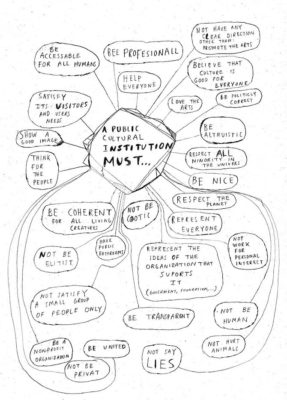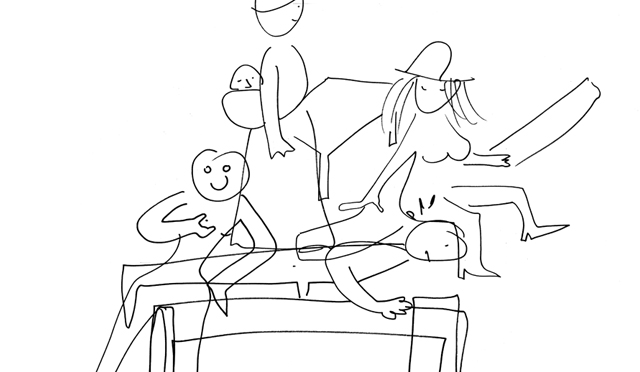Search
To search for an exact match, type the word or phrase you want in quotation marks.
A*DESK has been offering since 2002 contents about criticism and contemporary art. A*DESK has become consolidated thanks to all those who have believed in the project, all those who have followed us, debating, participating and collaborating. Many people have collaborated with A*DESK, and continue to do so. Their efforts, knowledge and belief in the project are what make it grow internationally. At A*DESK we have also generated work for over one hundred professionals in culture, from small collaborations with reviews and classes, to more prolonged and intense collaborations.
At A*DESK we believe in the need for free and universal access to culture and knowledge. We want to carry on being independent, remaining open to more ideas and opinions. If you believe in A*DESK, we need your backing to be able to continue. You can now participate in the project by supporting it. You can choose how much you want to contribute to the project.
You can decide how much you want to bring to the project.

An art institution is an organization that needs to know how to define, question, assess, and adapt itself to the needs of each moment. This is a subject that as an art magazine has kept us fairly busy over the years. In today’s article that we are recouping from our archives, Juan Canela returns to the subject but from a very specific context, that of Argentina. His text read today with the perspective of time, functions on two levels: it allows us to discover a context that not all of us can know first hand while enabling us to confront the situation of Europe.
I spent the last months of 2013 doing a research residency in Buenos Aires where I had the opportunity to get to know the art scene and the dynamics it produces. Beyond the evident differences, what’s interesting is the shift that is occurring in relation to the professionalization of artists and other agents, and in the calls for for a public institution capable of responding and articulating the context.
It’s a very different moment one could say almost the opposite of the one we are experiencing in these latitudes. In the Spanish state, as in other European countries, a general regression is occurring in relation to the presence of art and cultural institutions. Many of the centres that arose from the boom of the brick are now closed, or resisting on a shoestring, as a consequence of the economic crisis.
But I don’t think that it’s just money that is the problem. At the same time there’s a need to rethink the institution, the way it functions and its functionality; its dependency on certain cultural policies of a neoliberal nature; the political interference, or its slowness and limited capacity to respond to the needs of the local artistic community and the public at large that provoke a certain de-institutionalization of culture, that forces traditional spaces to rethink their meaning to regain centrality, something that rarely happens.
Returning to Buenos Aires, in a conversation with Victoria Northoon, the new director of the MAMBA, Museo de Arte Moderno of de Buenos Aires, that in the last year has formed a new team with the aim of regaining an institution dedicated to contemporary art in the city she commented that her idea of “the museum as a living organism, implies it has to adapt. We can’t predefine ourselves beforehand, so much as we’re learning how to become a museum with each day that passes.” The aim is to think of the museum as a place of reflection, experimentation and production, to be a museum that responds to the art community at the moment it produces its ideas. Which is obviously an excellent opportunity.
Before the new team took control of MAMBA in October last year, the artistic community was lacking a contemporary art museum in the city. And in response, in 2010 La Ene, the Nuevo Museo Energía de Arte Contemporáneo, that defines itself as “an independent project that arises out of and responding to the artistic community, and is an experiment in looking at the link between the artist, the institutions and the existing paths of legitimation”. From a small, modest space situated in a patio of the Santa Fe street, where in the last few years contemporary proposals and a team of young curators and coordinators have come together, for the last three years La Ene has been developing an interesting programme of exhibitions, talks and presentations, always trying to rethink what it means to be an art institution today in this context, while at the same time calling for an interesting dialogue with the more established spaces.
In these parts, we could think of other independent proposals that try to create a new institution in keeping with the times, like the Kunsthalle Athenas or the Kunsthalle Lissabon –that adopt the German term specifically so as to think about it in terms of the South of Europe.
In the workshop on Arte Útil that we organised a few weeks ago, Tania Bruguera commented on her idea of the museum as a “Social Power Plant” from where to generate a transforming energy. But she also stated that she hadn’t achieved it yet, and that in her Museum of Arte Útil, installed in the Van Abbe Museum in Eindhoven, she had to renounce her initial idea to end up generating a typical archive project. All a symptom of the way things are after more than twenty years of institutional critique, even in a museum like Van Abbe that is sensitive to these questions.
We need to share the circumstances, the issues regarding institutions that occur in different latitudes and at different moments, with the aim of learning from each other, to generate reflection on a trans-frontier level, to discern new dynamics and spaces for work and relation. Just as it’s urgent we become aware of our ethical and political responsibility as cultural workers in this new post-Fordian paradigm of work and it is mandatory we imagine a new institution that can react to the new scenario, that knows how to adapt to projects and not the other way round, and from where other forms of action can be articulated.

A*DESK is a critical platform focused on publishing, training, experimentation, communication and dissemination in relation to contemporary culture and art, which is defined by transversality. The starting point is contemporary art, because that is where we come from and this awareness allows us to go much further, to incorporate other disciplines and forms of thought in order debate issues that are relevant and urgent for understanding our present.
"A desk is a dangerous place from which to watch the world" (John Le Carré)